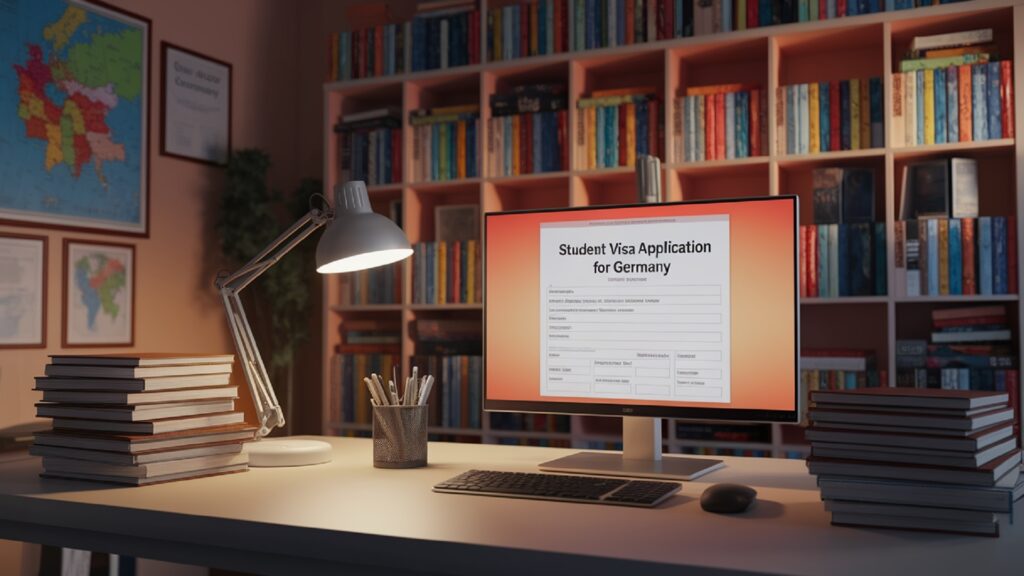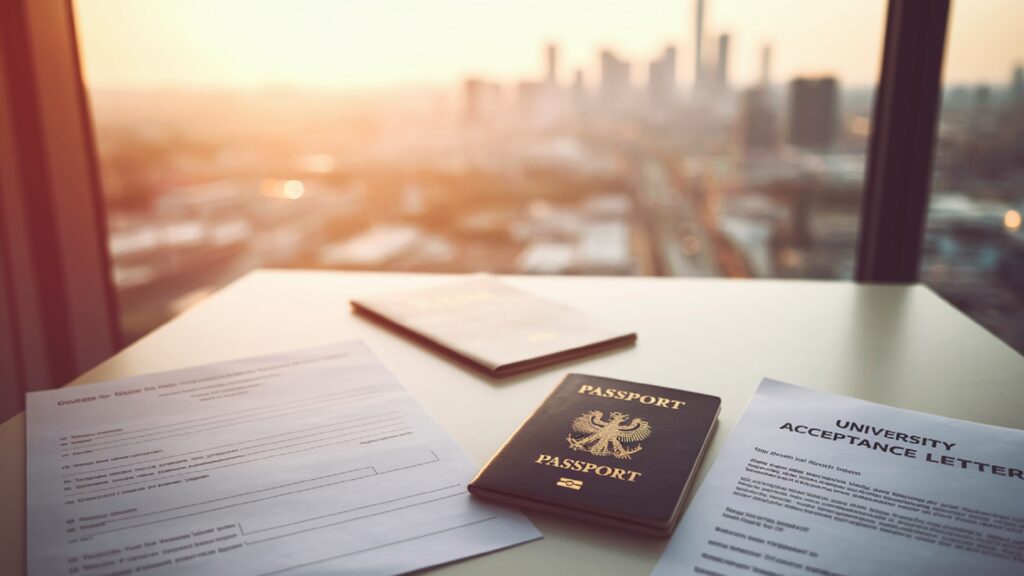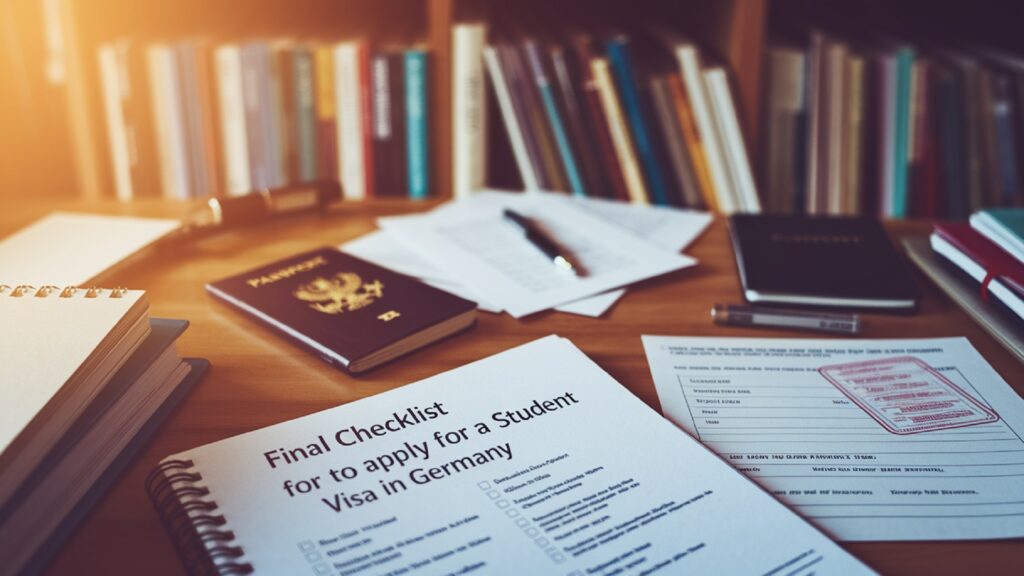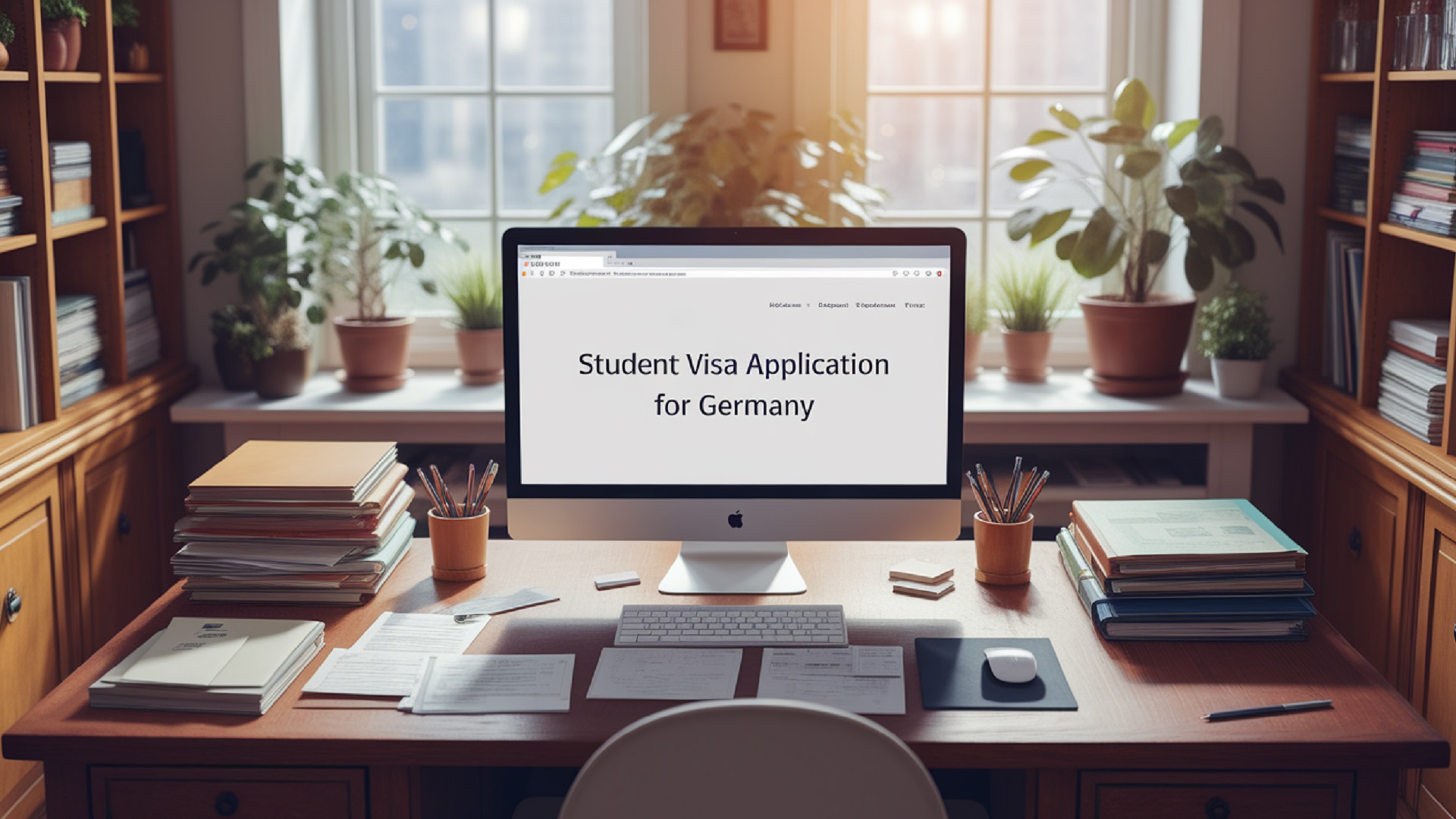Introduction to How to Apply for a Student Visa in Germany
How to apply for a student visa in Germany is often the very first question prospective international students ask. Germany offers outstanding higher‑education opportunities—many programs are tuition‑free or low-cost, and instruction is increasingly available in English. If you plan to study there, understanding the visa process is essential.
You step‑by‑stp through how to apply for a student visa in Germany, offering clarity, confidence, and structure. The timeline, document requirements, potential pitfalls, and helpful tips to ensure a smoth process. With the right preparation, you can avoid delays and unnecessary complictions.

What is How to Apply for a Studnt Visa in Germany?
When we talk about how to apply for a student visa in Germany, we’re referring to the formal application procedure non‑EU/EEA nationals must follow to obtain residence permission for full‑time academic studies in Germany. This visa grants legal status to live and stu dy in Germany for the duration of your program—be it a bachelor’s, master’s, or PhD degree.
The process includes receiving an official admission letter from a German university, demonstrating sufficient funds, purchasing health insurance, applying via a German diplomatic mission in your home country, attending an in‑person interview, and final approval. Each step has clear requirements and timelines, which differ slightly depending on your nationality and local embassy practice. Understanding these specifics is key to successful completion.
Also Visit This ( Top AI Tools for Content Creators ).
Benefits of How to Apply for a Student Visa in Germany
Getting clear on how to apply for a student visa in Germany brings multiple advantges:
- Legal status to live in Germany during your studies without ovrstaying your tourist rights
- Access to world‑class universities and research institutions at low or no tuition fee
- Eligibility for part‑time employment, such as working up to 120 full days or 240 half days per year
- Possibility to bring family members (in some cases), depending on visa type
- Post‑graduate job search options, including up to 18 months remining in the country after graduation
- Ability to travel freely within the Schengen Area once your residence permit is issued
The process will help ensure you submit a complete application. This reducs the chances of being asked for extra documents or facing a rejection due to informal errors or missed prerequisites.

How to Use How to Apply for a Student Visa in Germany Effectively
To make your journey smoother, follow this structured plan on how to apply for a student visa in Germany:
Step 1: Secure Admission
Apply and gain official acceptance from a recognizd German university or Fachhochschule. The admission letter is your key document for the visa.
Step 2: Check Latest Requirements
Visit the official German Federal Foreign Office and your local German embssy/consulate website. Requirements may vary slightly by country. Make sure you know the current financial thresholds, health insurance options, and embassy appointment rules.
Step 3: Book Your Visa Appointment
Once you have all documents ready, schedule an appointment at your local German mission. Waiting times vary—often a few weeks to a month. Early booking is recommnded.
Step 4: Prepare Documents
Gather these essential items:
- Valid passport
- University admission letter
- Proof of sufficient funds (such as a blocked account, scholarship letter, or sponsor affidavit)
- Health insurance proof (international plan or German statutory/private)
- Completed visa application forms
- Passport‑size photos
- CV and motivation letter (drafted clearly explaining your course, plans, and finances)
Step 5: Attend the Interview
Arrive early with all original documents and copies. Expect polite questioning about your study plans, financing, and ties to your home country. Be honest and concise.
Step 6: Visa Issuance & Pre‑Departure Prep
If approvd, you’ll receive a visa sticker in your passport or a confirmtion document. Plan your arrival in Germany, book housing, and continue gathering documents you’ll need when you arrive—e.g., to register with the local Einwohnermeldeamt, open a bank account, and finalize your residence permit.
Reviewing living costs and blocked account management can help you stay financially prepared.
Common Mistakes People Make
Many students encounter unnecessary delays when handling how to apply for a student visa in Germany due to common missteps:
- Missing signatures or incomplete forms
- Incorrect amount in blocked‑account proof
- Irrelevant or missing health insurance coverage
- Late appointment scheduling
- Failing to translate documents or certify them
- Unclear motivation letters
Even minor oversights can cause long procssing delays or rejection. Double‑check every detail before submitting.
Understanding the Visa Application Timeline
When learning how to apply for a student visa in Germany, one of the most crucial factors is timing. The German visa process is not something you should leave to the last minute. Proper planning, document collection, and appointments can take several weeks—or even months—depnding on your location and the demand at your local German consulate.
General Timeline Overview
Here’s a typical timeline breakdown you can use as a reference:
| Stage | Recommended Timeframe |
|---|---|
| University application | 9–12 months before your course |
| University admission | 6–8 months before your course |
| Blocked account setup | 5–6 months before your course |
| Health insurance confirmation | 4–5 months before your course |
| Visa appointment scheduling | 3–4 months before your course |
| Visa interview & submission | 2–3 months before your course |
| Visa processing | 4–12 weeks, depending on country |
| Arrival in Germany | 2–4 weeks before your course |
Embassy Processing Times
While the how to apply for a student visa in Germany steps are broadly consistent, some countries experience longer wait times. For example:
- India & Pakistan: High student volume; visa processing may take 8–12 weeks
- Nigeria: Often requires more document verifiction
- Brazil & Argentina: Generally faster, averaging 4–6 weeks
- Middle East countries: Variable depending on embassy workload
It’s always advised to check directly with your German embassy’s website. Each location may have slight variations in required documents, preferred paymnt methods, and document transltion or notarization rules.

What Happens After You Arrive in Germany?
Knowing how to apply for a student visa in Germany is only half the story. Once you land, ther are key next steps to maintin your legal status and prepare for student life.
1. Residence Registration
Wthin 14 days of your arival, you must register your address with the local Einwohnermeldeamt (resident registration office). Bring your rental contract and landlord confirmtion (Wohnungsgeberbestätigung). You’ll receive a registration certificate (Meldebescheinigung) needed for all other formalities.
2. Residence Permit Application
Your initial visa is often valid for 90 days. Within that period, visit the Ausländerbehörde (foreigners’ office) to apply for a longer-term residence permit. Bring:
- Passport
- Visa
- University admission proof
- Registration certificate
- Proof of health insurance
- Proof of finances
- Biometric photo
- Application fee (usually €100)
This residence permit is usualy granted for one year initially and renewed based on your academic progress.
3. Open a Bank Account
You’ll need a German bank account to manage rent, pay bills, and receive transfers (such as from a blocked account). Options include N26, Deutsche Bank, Commerzbank, and others. Many offer student accounts with no fees.
4. Get a German SIM Card
You’ll need a local number for banking, university communication, and everyday life. Providers like Vodafone, O2, and Telekom offer affordable student plans with data and calls.
5. Enroll at the University
This process (Immatrikulation) officially makes you a student. You’ll need:
- Visa/residence permit
- Admission letter
- Proof of health insurance
- Passport photos
- Payment of semester fees (~€250–350)
After enrollment, you’ll receive your student ID and public transprt pass (in most regions).
Important Country-Specific Notes on How to Apply for a Student Visa in Germany
While the process for how to apply for a student visa in Germany follows a general structure, there are country-specific details that can significantly impact your experienc. Below are examples of unique requirements or tips for applicants from major sending countries:
Indian Students
- Book your VFS appointment 3–4 months in advance
- Most applicants use Fintiba or Expatrio for blocked accounts
- Indian insurance policies are usually not accepted—choose TK, AOK, or Mawista
- Interview questions often focus on academic goals and career plans
Nigerian Students
- Extra document authentication may be required
- Embassy may request criminal record certificates
- Funding scrutiny is stricter—avoid unclear sponsorship letters
- Some German universities may require direct confirmation of admission
Chinese Students
- APS certificate (Academic Evaluation Center) is mandatry
- Long waiting times for appointment slots
- Most students use China Construction Bank or Fintiba for financial proof
- Be prepared to explain course selection and ties to China
Latin American Students
- The process is more straightforward
- Spanish documents must be translated into German or English
- Local embassies may require notarization of eduction records
- Proof of return plans strengthens the application

What If Your First Visa Attempt Is Rejected?
Even if you’ve followed all the steps on how to apply for a student visa in Germany, rejections can happen. Common reasons include:
- Incomplete or inconsistent documenttion
- Doubts about your true intent to study
- Insufficient financial proof
- Unclear academic progression or gap years
Don’t panic. A visa rejection is not the end of the road.
Here’s what to do:
- Carefully read the rejection letter. It will explain the embassy’s reasoning.
- Correct and improve your application. Add detail to your motivation letter, improve financial documents, or reapply with stronger health insurance coverage.
- Request an appointment to clarify. Some embassies offer the option to meet or email with a visa officer for guidance.
- Appeal or reapply. If your rejection was due to a minor error or misunderstanding, you may appeal the decision in writing—or simply reapply with stronger evidence.
Many students succeed on their second attempt with a clearer and more organized application. If you do reapply, be transparent about your previous attempt and show how you’ve strengthened your case.
Working in Germany as a Student
Once you’ve learned how to apply for a student visa in Germany and have arrivd in the country, a common follow-up question is: Can I work while studying? The answer is yes—with conditions.
International students from non-EU/EEA countries are permittd to work part-time during their studis in Germany.
Student Work Limits
According to German immigration law:
- You may work 120 full days or 240 half days per calendar year
- This applies to both on-campus and off-campus jobs
- Internships may also count toward this limit (if they are paid)
- Working more than this requires special permission from the Ausländerbehörde (immigration office)
💡 Tip: A “full day” means up to 8 hours of work. A “half day” is considered up to 4 hours.
Popular Student Jobs
- Research assistant or tutor (HiWi jobs at university)
- Barista or restaurant staff
- Retail assistant in stores
- Internships related to your field of study
- Delivery services (e.g., food or packages)
- Freelance or remote work—limited but possible under specific rules
Working part-time not only helps you cover living expenses bt also imprves your German language skills and builds your resume. Always ensure your work hours don’t negatively affect your academic progress—especially if your visa renewal depends on good performance.

How to Extend Your Stay After Graduation
After successfully navigting how to apply for a student visa in Germany and complting your studies, you might want to stay longer—to seek employment, gain work experience, or transition to permanent residency.
Post-Study Options
Germany supports international graduates through generous post-study opportunities:
1. Job-Seeker Visa (18-Month Extension)
Graduates of German universities can apply for an 18-month residence permit to look for a job related to their field.
- Must have completed a recognized degree
- Must provide proof of health insurnce and funds
- Can work in any job during this period to support yourself
2. EU Blue Card
If you find a qualified job with a minimum gross annual salary (currently around €45,300 for most fields or €41,041.80 for STEM), you can apply for an EU Blue Card, a pathway to permanent residency.
3. Residence Permit for Employment
If your job doesn’t qualify for a Blue Card but is related to your degree, you can still apply for a standard work visa.
Cultural & Academic Integration Tips
Knowing how to apply for a student visa in Germany is just the beginning of your study abrod journey. To truly succeed, you’ll also need to adapt to life in Germany—both socially and academically.
Academic Culture in Germany
- Self-discipline is key: There’s less hand-holding compared to some education systems. You’re expected to take initiative.
- Participation varies: Lectures are often large and less interctive, but seminars encourge discussion.
- Exams are serious business: Failing doesn’t mean the end, but be prepared—some exams weigh heavily on final grades.
- Plagiarism is taken seriously: Learn proper citation practices and academic writing conventions early on.
Social and Cultural Adaptation
- Learn basic German: Even if your course is in English, learning day-to-day phrses will make life easier
- Be punctual: Germans value timekeeping highly—whether for class or social evnts
- Expect formality at first: Addressing professors with “Herr” or “Frau” and using “Sie” instead of “du” is a sign of respect
- Recycle diligently: Germany takes environmental responsibility seriously
Community Support Resources
- International student offices (Akademisches Auslandsamt)
- Student unions (Studentenwerk)
- Erasmus student networks
- Church-based or NGO groups offering cultural meetups and free events
📍 Vistit This Link: German Academic Exchange Service – A trusted source for students applying to study in Germany.
Final Checklist for How to Apply for a Student Visa in Germany
To summarize, here’s a step-by-step breakdown of everything you need:
Before Applying
- Secure admission letter
- Research embassy requirements in your country
- Open a blocked account (e.g., via Fintiba or Expatrio)
- Get valid health insurance
- Translate and certify required documents
- Write a compelling motivation letter
Application Stage
- Book an appointment early
- Submit all documents with extra copies
- Be honest and concise in your visa interview
- Keep scanned copies of everything
After Approval
- Book flight and housing
- Register your address in Germany (Anmeldung)
- Apply for a residence permit
- Complete university enrollmnt
- Open a local bank account
- Join student and cultural communities

FAQs About How to Apply for a Student Visa in Germany
What’s the best time to start the application process?
Start at least 6–8 months before your course begins. Some embassies have long wait times for visa appointments. Don’t delay.
How much money is needed to prove financial resources?
As of 2025, the required amount is €11,208 per year. This is typically shown via a blocked account or a scholarship/sponsor letter.
Can I apply for a student visa without final admission?
Yes—if you have a conditional admission or are attending a preparatry course. You’ll need to apply for a student applicant visa, which can be converted later once full admission is granted.
Do I need to speak German?
Not necessarily. Many programs are taught in English. German language skills are helpful for everyday life and increase your chances of finding part-time work.
What happens if my visa is delayed?
If your visa is still processing after your course starts, inform your university. Some allow remote attendance or delayed enrollment. Stay in communication with both your university and the embassy.
Author Remarks
How to apply for a student visa in Germany is a crucial first step for any international student hoping to pursue higher education in one of Europe’s most innovative and affordable academic environments. Although the process can seem complicated at first glance, breaking it down into clear steps—preparing documents, applying early, and avoiding common mistakes—makes the entire experience manageable and even empowering.
Let’s quickly recap what you’ve learned:
- You must first gain admission to a recognized German university before starting your visa process.
- The visa requires proof of finances, health insurance, a clean academic plan, and a clear motivation letter.
- Timing is everything—start the application process at least 6–8 months before your intended semester.
- Even if your first attempt is unsuccessful, you can and should reapply with improvements.
- After arrival, stps like registration, health insurance confirmation, and residence permits must be completed.
- Working part-time is allowed under specific rules, and you can extend your stay post-graduation for job-seeking or work opportunities.
- Integrating into German academic and social life requires planning, openness, and a proactive mindset.
Many international students before you have successfully gone thrugh this journey. Whether you’re from India, Nigeria, Brazil, or China, the process may differ slghtly, but the core structure remains the same. Mastering how to apply for a student visa in Germany doesn’t just get you across the border—it sets you up for an enriching, successful academic future.

1 thought on “How to Apply for a Student Visa in Germany”